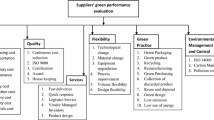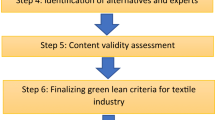Abstract
Lean production is regarded as systematic solution for identifying and eliminating waste through continuous improvement of manufacturing processes to meet customers’ requirements. Due to rising environmental concerns and the significant environmental impact of companies operations, issues such as environmental management and green production are on board agendas. In essence, green production seeks to reduce the environmental impacts of business processes. In order to examine green production, an original equipment manufacturer in the supply chain of tractor manufacturing industry is selected for this work to enable a focus on lean production aspects and its specific requirements to evaluate a company-specific production system (XPS). The results suggest that the company utilizes six lean-green production criteria including suitable and green packaging, quality improvement, waste reduction, environmental pollution reduction, transport management and additional transportation reduction, and cost reduction. Furthermore, continuous improvement and integrated auditing are selected as two critical and fundamental elements with the highest ranks, regarding the relationships between the XPS elements and lean-green production criteria.




Similar content being viewed by others
Data availability
The data that support the findings of this study are openly available. The authors declare that the data are not available and can be presented upon the request from the readers.
Notes
Toyota Material Handling
Scania Production System
Volvo Production System
Volvo Cars Manufacturing System
Best-Worst Method
Abbreviations
- XPS:
-
company-specific production system
- DEMATEL:
-
Decision-Making Trial and Evaluation Laboratory
- BWM:
-
Best Worst Method
- QFD:
-
quality function deployment
- AHP:
-
analytic hierarchy process
- KPI:
-
key performance indicator
- OHS:
-
Occupational Health and Safety
- QMS:
-
Quality Management System
References
Akif Gundu M, Demir S, Paksoy T (2021) Matching functions of supply chain management with smart and sustainable tools: a novel hybrid BWM-QFD based method. Comput Ind Eng 162:10776. https://doi.org/10.1016/j.cie.2021.107676
Andrea A, Jabbour CJC, Adamo ID, Gastaldi M, Settemre-Blundo D (2022) Green recovery in the mature manufacturing industry: the role of the green-circular premium and sustainability certification in innovative efforts. Ecol Econ 193:107311
Anthony Inman R, Green KW (2018) Lean and green combine to impact environment and operational performance. Int J Prod Res 56:4802–4818. https://doi.org/10.1080/00207543.2018.1447705
Avakh Darestani S, Shamami NH (2019) Performance evaluation of lean production based on balanced score card method using ANP and SIR: a case from Iranian home appliance industry. Opsearch 56(12):717–738
Bergmiller GG, McCright PR (2009) Lean manufacturers’ transcendence to green manufacturing. In: Proceedings of the 2009 Industrial Engineering Research Conference, Miami, FL
Blücher D, Öjmertz B (2008) Utmana dina processer, Resurseffektiva tankesätt och principer: en introduktion till Lean production. Swerea-IVF, Mölndal, Sweden
Cabral L, Amanor KS (2021) Tractors, states, markets and agrarian change in Africa. J Peasant Stud 49(1):129–136. https://doi.org/10.1080/03066150.2021.1918115
Davari, S., Pure knowledge - concepts and theory, Kindly Publishing, fourth edition, Second edition, (2009).
Fazlzadeh A, Hagh MM (2014) Lean production system, green movement. In: Fourth National Conference on Health and Environment and Sustainable Development. Islamic Azad University, Bandar Abbas, Bandar Abbas, Iran
Fiorello M, Gladysz B, Corti D, Wybraniak-Kujawa M, Ejsmont K, Sorlini M (2023) Towards a smart lean green production paradigm to improve operational performance. J Clean Prod 413:137418
Florentina M, Alves A (2015) Lean companies in the track of sustainability. In: 6th International Conference on Mechanics and Materials in Design, Ponta Delgada, Azores, pp 56–76
Harlin U, Moestam Ahlström L, Medbo L, Svenningstorp J (2008) A production system assessment approach within Swedish automotive industry. In: Proceedings of the Swedish. Production Symposium. Stockholm, Sweden, pp 18–20
Harvey T (1995) An education 21 programme: orienting environmental education towards sustainable development and capacity building for Rio. Environmentalist 15:202–210. https://doi.org/10.1007/BF01901576
Hosseini Anvari H, Aghdashi SB (2008) Lean thinking in manufacturing management. In: Fourth International Project Management Conference. Ariana Research Group, Tehran
Jayaram J, Das A, Nicolae M (2010) Looking beyond the obvious: unraveling the Toyota production system. Int J Prod Econ 128:280–291
Kurdve M, Zackrisson M, Wiktorsson M, Harlin U (2014) Lean and green integration into production system models – experiences from Swedish industry. J Clean Prod 85:180–190. https://doi.org/10.1016/j.jclepro.2014.04.013
Life and Style Hub (2022) Role of tractors in agricultural production boost. In: Role of tractors in agricultural production boost. Life & Style Hub lifeandstylehub.com
Liker J (2004) The Toyota way: 14 management principles from the world’s greatest manufacturer. McGraw-Hill, New York, NY
Lotfi M, Saghiri S (2018) Disentangling resilience, agility and leanness: conceptual development and empirical analysis. J Manuf Technol Manag 29(1):168–197. https://doi.org/10.1108/JMTM-01-2017-0014
Magnusson K, Kroslid D, Bergman B (2003) Six sigma: the pragmatic approach. Student literature, Lund, Sweden
Netland T (2013) Exploring the phenomenon of company-specific production systems: one-best-way or own-best-way? Int J Prod Res 51:1084–1097
Ninlawan C (2010) The implementation of green supply chain management practices in electronics industry. In: Proceedings of the International Multi conference of Engineers and Computer Scientists, pp 17–19
Pampanelli AB, Found P, Bernardes AM (2013) A lean & green model for a production cell. J Clean Prod 85:19–30
Powell D, Riezebos J, Strandhagen JO (2013) Lean production and ERP systems in small-and medium-sized enterprises: ERP support for pull production. Int J Prod Res 51:395–409
Pozzi R, Cannas VG, Ciano MP (2022) Linking data science to lean production: a model to support lean practices. Int J Prod Res 60:6866–6887. https://doi.org/10.1080/00207543.2021.1946192
Rao P (2006) Greening production: a south-east Asian experience. Int J Oper Prod Manag 24(3):289–320
Reda H, Dvivedi A (2022) Decision-making on the selection of lean tools using fuzzy QFD and FMEA approach in the manufacturing industry. Expert Syst Appl 192:1–12. https://doi.org/10.1016/j.eswa.2021.116416
Shahin A, Janatyan N (2010) Group technology (GT) and lean production: a conceptual model for enhancing productivity. Int Bus Res 3:105–118. https://doi.org/10.5539/ibr.v3n4p105
Singh C, Singh D, Khamba JS (2021) Understanding the key performance parameters of green lean performance in manufacturing industries. Mater Today:Proc 46:111–115
Tortorella GL, Fettermann D, Cauchick Miguel PA, Sawhney R (2019) Learning organization and lean production: an empirical research on their relationship. Int J Prod Res 58(12):3650–3666. https://doi.org/10.1080/00207543.2019.1633028
Vahabi Nejat S, Avakh Darestani S, Omidvari M, Adibi MA (2021) Evaluation of green lean production in textile industry: hybrid fuzzy decision-making framework. Environ Sci Pol 29:11590–11611
Womack JP, Jones DT, Ross D (1990) The machine that changed the world: the story of lean production e Toyota’s secret weapon in the global car wars that is now revolutionizing world industry. Rawson Associates, New York, NY
Zaim S, Şevkli M (2002) The methodology of quality function deployment with crisp and fuzzy approaches and an application in the Turkish shampoo industry. J Econ Soc Res 4:27–32
Zhenyuan J, Xiaohong LU, Wei W, Defeng J, Lijun W (2011) Design and implementation of lean facility layout system of a production line. Int J Indust Eng Theory Appl Pract 18:260–269
Author information
Authors and Affiliations
Contributions
Elmira Aghaei (EA) has contributed to the methodology, investigation, project administration, validation, data collection, and software. Soroush Avakh Darestani (SAD) contributed to the conceptualization, writing—review and editing, visualization, and supervision.
Corresponding author
Ethics declarations
Consent to participate
The authors declare that they agree with the participation of the journal.
Consent for publication
The authors declare that they agree with the publication of this paper in this journal.
Conflict of interest
The authors declare no competing interests.
Additional information
Responsible Editor: Arshian Sharif
Publisher’s Note
Springer Nature remains neutral with regard to jurisdictional claims in published maps and institutional affiliations.
Rights and permissions
Springer Nature or its licensor (e.g. a society or other partner) holds exclusive rights to this article under a publishing agreement with the author(s) or other rightsholder(s); author self-archiving of the accepted manuscript version of this article is solely governed by the terms of such publishing agreement and applicable law.
About this article
Cite this article
Aghaei, ., Darestani, S.A. A fuzzy decision support system for evaluating Lean-Green and company-specific production system. Environ Sci Pollut Res 31, 5444–5456 (2024). https://doi.org/10.1007/s11356-023-30667-6
Received:
Accepted:
Published:
Issue Date:
DOI: https://doi.org/10.1007/s11356-023-30667-6




